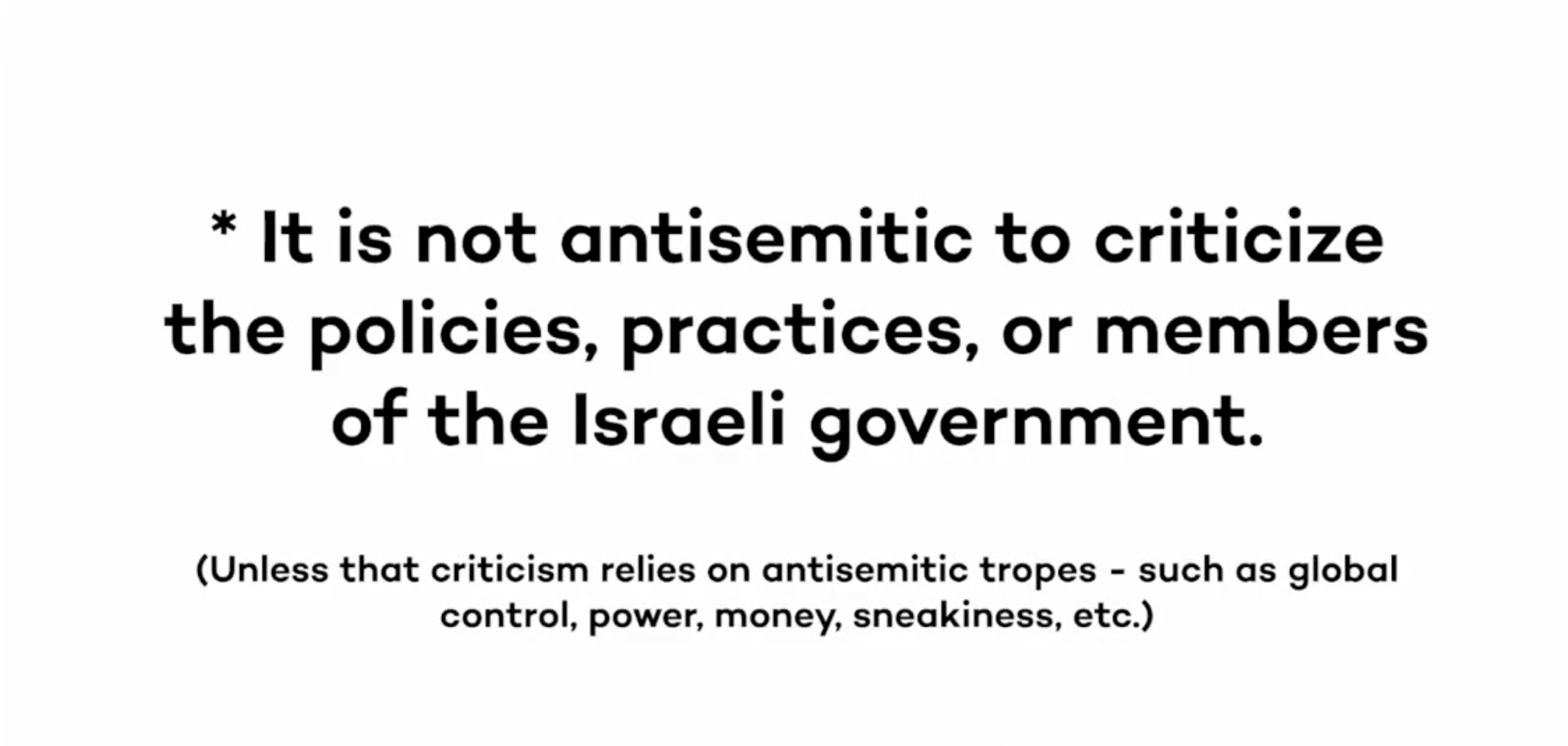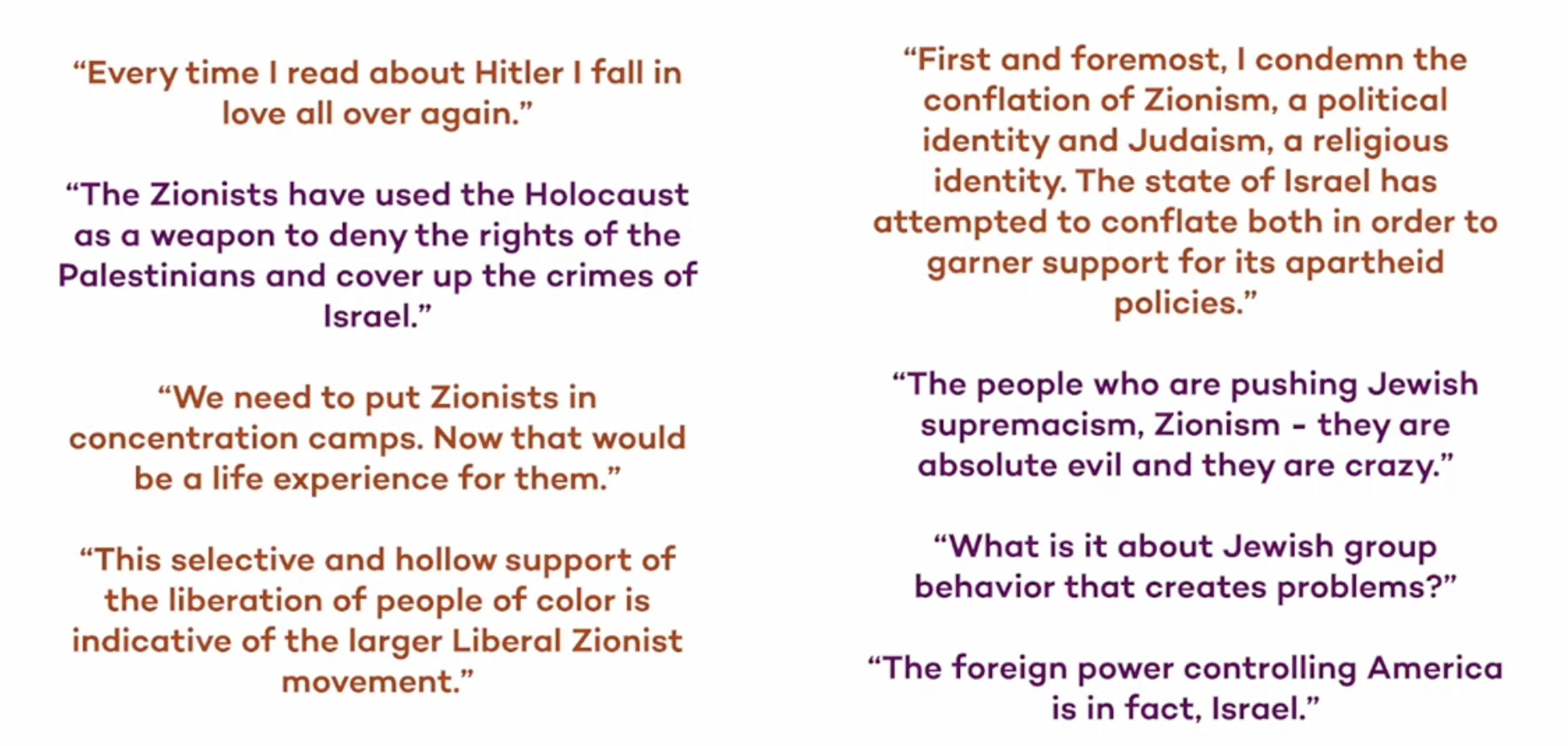Evanston RoundTable: Northwestern’s required antisemitism training sparks controversy
Some students claim required anti-bias module is one-sided
by Margo MilanowskiOctober 5th, 2025
Israel supporters stage a counterprotest across from Northwestern's Gaza Solidarity Encampment on April 28, 2024 at Deering Meadow. Credit: Joerg Metzner
A training module on antisemitism that Northwestern University students are required to take, first launched early in 2025, has now sparked complaints of bias from some amid ongoing fears of registration holds and lost wages for those who refuse to complete it.
The training contains inaccuracies and harmful insinuations, some students say, such as comparing critics of Israel to former Ku Klux Klan leader David Duke.
“Northwestern has communicated that the eventual outcome of not being enrolled is losing our paycheck,” said Laura Jaliff, a Ph.D. candidate in the Department of Civil and Environmental Engineering, a member of Northwestern Graduate Workers for Palestine and an elected leader of the graduate student union.
An email from the university that Jaliff shared with the RoundTable confirmed this communication.
“If you remain unregistered by Oct. 20 in the Fall or Feb. 2 in the Winter, your academic program will be discontinued, terminating your student affiliation with Northwestern until you complete the attestations and your application to return is approved,” the email said.
“In keeping with past practice, student employees who hold jobs that require student status, including teaching and research assistantships and similar roles, will not be immediately removed from those positions after termination of student status, but they will not be eligible to be hired or for their appointment to continue beyond Fall Quarter without resolution of the hold and approval to return.”
Jaliff doesn’t take classes anymore because her research funding no longer requires her to do so. She said, though, that Northwestern mandates researchers to enroll in a credit “course” to indicate they are doing research full time, and she has to complete the training module to do that.
She said she chose not to complete the anti-bias training due to her concern that it actually creates bias, and that the university is now preventing her from enrolling in her research credit. For its part, Northwestern says about three dozen students are facing registration holds for failing to complete the training, down from more than 300 last week, which The Guardian first reported.
“There’s a lot of things that are very unclear,” Jaliff said. “I worry they will use this to finally cut off our paychecks at some point.” Like most Ph.D. candidates, Jaliff gets a stipend from the university, and many undergraduate students receiving financial aid also have work study jobs tied to their enrollment.
In a written statement to the RoundTable, Northwestern did not deny the possibility that student wages are on the line.
“As with other mandatory student trainings, failure to complete this training can result in University action, including a registration hold,” a university spokesperson wrote in an email. “Students are not required to agree with the training modules but must attest that they will abide by the Student Code of Conduct, as well as the University’s policy on Discrimination, Harassment and Sexual Misconduct.”
Training content and context
Earlier this year, with Northwestern under intense scrutiny from Republicans in Congress over an alleged failure to combat antisemitism on campus, the university released a new training module that all students had to take called “Building a Community of Respect and Breaking Down Bias.” The module was created by the Jewish United Fund, a publicly pro-Israelorganization.
Former NU President Michael Schill came under fire for the university’s handling of a student pro-Palestinian encampment in April 2024. Schill was also questioned by a U.S. House committee on student protests and alleged acts of antisemitism on campus.
In April of this year, the Trump administration froze $790 million in federal grants and contracts previously allocated to Northwestern, as the U.S. Department of Education and Department of Justice launched civil rights investigations into NU.
Like all required trainings for Northwestern students, including on sexual assault prevention and substance use, failing to complete the anti-bias module could result in a registration hold.
According to Jaliff, though, students have previously been able to obtain waivers to skip trainings in the past if they reached out to the school with a specific concern about engaging with the content.
Jaliff told the RoundTable that the the school began enforcing registration holds on students who did not complete the antisemitism training at the beginning of the 2025 summer term. After seeing the content in the module, Jaliff told the RoundTable that the graduate student union filed a grievance with the school, specifically over concerns about threats to their employment. But Northwestern “flat out rejected” the grievance in an email without any meeting between the union and school officials, which she said would usually take place.
Following this rejection, the Northwestern Graduate Workers for Palestine wrote an open letter to the school urging NU to let students register for classes. In that letter, graduate workers also asked for students to not be expelled for refusing to complete the module and for the school to stop sharing the training video altogether.
The training, obtained and reviewed by the RoundTable, does say toward the end of its content that criticism of Israel is not inherently antisemitic unless that criticism relies on antisemitic tropes or conspiracy theories. Jaliff and others who wrote and signed the union letter, though, argued that the video’s content ultimately doesn’t reflect this statement.
Their letter calls out an “unequal attention to the histories of Israel and Palestine, and to the losses of life among Israelis and Palestinians.”
According to Israeli military figures reported by Reuters, 454 Israeli soldiers have died in combat since Oct. 27, 2023, and 1,200 people died in the Oct. 7 Hamas attack on Israel. Reuters also reports that Israel’s campaign has killed more than 60,000 people in Gaza.
The open letter also takes issue with the video’s historical lens of Israel, noting that the video says “Israel was founded in 1948 ‘on British land’ and omits any mention of the preexistence and consequent displacement of the indigenous Palestinian communities.”
The training does begin a sentence with “when the state of Israel was formed in 1948 on land held by the British after the fall of the Ottoman Empire” and goes on to explain the protest of surrounding nations against Israel’s creation. It does not mention who lived on the land at that time.
Other complaints about the video in the letter include a lack of cited sources, that it homogenizes Jewish voices, that it prevents Palestinian students from expressing their national identity and that the “video vilifies and slanders the movement for the rights of the Palestinian people.”
Specifically, the letter cites an activity where the training module asks students to read quotes from both “anti-Israel activists” and a member of the KKK, and if they can tell a difference between them.
The video narrator states that “to most Jewish people, they feel the same, because they are the same.”
A screenshot from the required antisemitism training. The statements in orange are from “anti-Israel activists,” and the statements in purple are from David Duke, former grand wizard of the Ku Klux Klan. Credit: Obtained by the RoundTable
One of these statements reads: “First and foremost, I condemn the conflation of Zionism, a political identity and Judaism, a religious identity. The State of Israel has attempted to conflate both in order to garner support for its apartheid policies.”
In Jaliff’s opinion, this quote reflects the very criticism of Israel that the training module said was OK just moments before.
“That is an extremely damaging quote to put in there next to actually antisemitic quotes,” Jaliff said. She added that the video implies that “a criticism of the fact that the government of Israel has tried to conflate Zionism and Judaism to protect itself from criticism is antisemitic — and that cannot be seen as antisemitic.”
Meanwhile, beyond Northwestern’s campus, the director of the largest Muslim civil rights organization in the country, the Chicago branch of the Council on American-Islamic Relations (CAIR-Chicago), earlier called the training video “state-sponsored thought enforcement” and “the stuff of authoritarian regimes.”
Differing opinions
Claire Conner, a Northwestern undergraduate and the student president of the Northwestern campus Hillel, disagreed with Jaliff’s characterization of the training.
Speaking to the RoundTable, Conner said she “appreciated that nuance, and the fact that they were willing to kind of go actually beyond the mainstream Jewish perspective which was being presented into something that was inclusive of a way that a lot of Jewish people felt.”
Conner recalls completing the training earlier this year, but she’s since rewatched the video as controversy rose around it.
“Part of why I was surprised about the boycott of the training is that it’s especially pluralistic, and it recognizes that it’s actually a Jewish value to encourage disagreement and debate, and that not all Jewish people agree with all of the video, and that that’s okay,” Conner said.
She said she was frustrated with what she described as a refusal to listen to other perspectives in the video, whether or not someone agrees with them.
“In this moment, in a time of rising antisemitism across the country and on college campuses, it’s important that people at least listen to a mainstream American Jewish perspective on Jewish history, culture, values and what modern antisemitism looks like,” Conner said.
“They don’t have to agree with it or endorse it. But it is really important that they listen, because that’s a prerequisite for having informed conversations about antisemitism on campus.”
The Guardian’s Sept. 27 story said “at least 300” students were facing registration holds for not completing the training, and Jaliff also said administrators had previously told the grad student union that the number was in the hundreds.
Now, though, the university says less than three dozen students have yet to complete the training.
“I’m comforted by the recent information that it’s actually a much smaller group of individuals,” Conner said, “but it’s still upsetting.”
In Jaliff’s opinion, she attributes the lowered number to those who recently took the training “under duress” as they faced the reality of a registration hold impacting their ability to register for classes. For international students, she noted, a hold could also lead to issues keeping their visas, which usually require course enrollment.
Incoming freshmen
According to Jaliff, Northwestern has not yet sent the training to first-year students, who arrived in Evanston a few weeks ago.
Moving forward, Jaliff and other members of the Graduate Workers for Palestine group are working to “prepare new students to make an informed decision on how to assess personal risk and organize in objection to the training if they wish to be conscientious objectors.”
Administrators told the group that freshmen will receive the training sometime in the next month.
“The number of students who are refusing to take the training on the grounds that it contains damaging political propaganda that has no place in our workplace will inevitably grow,” Jaliff said. “This is not a problem that Northwestern has solved by forcing preexisting students to take the training; it is a problem that will exist as long as the elements outlined in our letter are present in this mandatory workplace training.”
Editor’s note: This story has been updated to correct the attribution of the open letter to the Northwestern Graduate Workers for Palestine and of a quote to Claire Conner.




